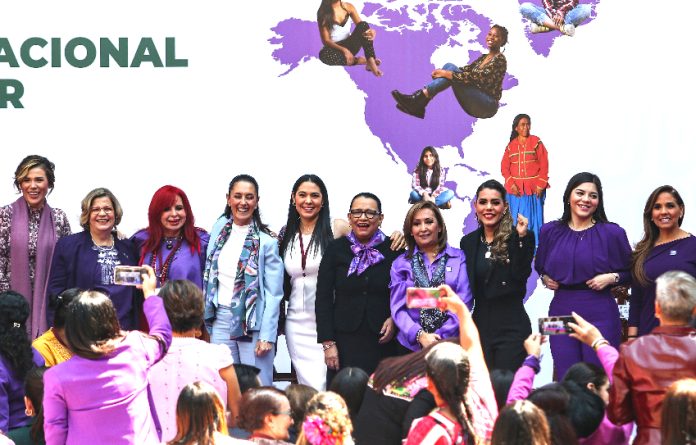You might have been surprised when the news broke that Mexico — a country historically known for chauvinism — is on the path to elect a woman as president in 2024.
But Xóchitl Gálvez and Claudia Sheinbaum are not aberrations in the country’s political landscape. Mexico’s Congress achieved gender parity in 2018, meaning half of Mexico’s senators and federal deputies are women. Women govern in 10 Mexican states, and President López Obrador’s cabinet is also 50-50 women and men, with women in some of the most prominent positions: Interior Minister, Foreign Affairs Minister and Security Minister.
In January, the Supreme Court elected its first female chief justice, Norma Piña. Ruling party Morena is again putting forward a woman, Clara Brugada, to run for Mexico City mayor (Sheinbaum was the city’s first female mayor, elected in 2018) in compliance with gender quotas that require parties choose five women as candidates in the nine gubernatorial races of 2024.
And yet, Mexican women didn’t gain the right to vote nationwide until 1953, three decades after women’s suffrage was achieved in the United States. How did this political transformation happen?
Xóchitl and Claudia were chosen by their respective parties as the most competitive candidates from a pool of mostly men. Their nominations were not the result of gender quotas, but it’s safe to say that the use of these quotas — most consistently since the electoral reform of 2014 – is responsible for bringing more women than ever into Mexican politics.
The numbers are startling. In 2009, 93.7% of Mexico’s governors were men, as were 72.4% of federal deputies and 80.5% of senators. At that point, only six women had ever been governor of a state. Yucatán state’s legislature had the highest number of women lawmakers in 2009, at 40%, and the lowest was Chiapas, with a mere 4.2%. In contrast, in 2022, for the first time, there were more women than men in state legislatures (566 women, 496 men and 1 non-binary person).
This acceleration hasn’t been smooth, with political parties at times resisting the push towards gender parity by exploiting legal loopholes.
One of the best-known cases of this occurred in 2009 when eight female federal deputies resigned and were replaced by their designated substitutes – all of whom happened to be men. In a number of cases, they were men related to the women who had been elected. The group of women legislators were dubbed “Las Juanitas” in the press, in reference to another 2009 election, when a man named Rafael “Juanito” Acosta agreed to resign upon election as mayor of Iztapalapa to make way for his substitute, Clara Brugada. The case of “Las Juanitas” led to modifications in electoral regulation – parties thereafter had to choose substitutes of the same gender as the candidates they put forward.
Another scandal happened much more recently: In 2021, a party called Fuerza por México (which has since dissolved) declared 18 male candidates for various municipal offices in the state of Tlaxcala were actually trans women in order to comply with gender parity law. The maneuver caused such confusion they almost got away with it. However, after word got out about the deception, the state electoral board revoked the candidacies of the men who had switched genders.
There are 19 states in Mexico that have gender identity laws on the books, which allows for individuals to officially change their gender at a civil registry. In the rest of the country, this change is a slower, more arduous legal process. Legal analysts and feminist activists have pointed out concerns similar to those in other countries debating how to avoid the abuse of gender self-ID to either “avoid financial, civil or judicial obligations” — or in this case, to get elected.
“It is essential to rethink these identity laws,” said feminist activist Arussi Unda in the immediate aftermath of the Tlaxcala case, quoted in El País newspaper. “Because they end up not benefiting women or the LGBTI community, since they are easily manipulated.”
So if we look beyond the sphere of politics, how do Mexican women fare in comparison to men?
Mexico ranked 25th on the 2020 World Economic Forum’s Global Gender Gap Report of 153 countries, which includes metrics beyond political representation, including women’s economic empowerment, educational attainment and health outcomes. The United States ranked in 53rd place in the same report, held back mostly by the relative lack of women in U.S. politics. Canada ranked 19th, but both the northern countries scored lower than Mexico on political empowerment, while Mexico scored below both on economic equality.
While women’s labor participation in Mexico has reached historic levels (46.4% in Q3 this year), according to a recent report by think tank IMCO, the gap in women’s leadership roles in the Mexican business world is wide. Women hold only 13% of leadership positions in the 184 companies surveyed and a mere 4% have a female chief executive.
At this rate, IMCO calculated that the gender gap in Mexican businesses will not be closed until 2052. Women in the U.S., by comparison, have reached 31.7% of top executive positions across industries.
Will female policymakers enable (and enforce) broader opportunities for women across society? As women advance into the highest levels of political power in Mexico, we will soon find out.
Kate Bohné is chief news editor at Mexico News Daily. You can find her writing on The Mexpatriate.
